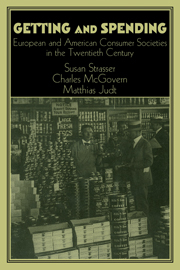Book contents
- Frontmatter
- Introduction
- Part One Politics, Markets, and the State
- Part Two Everyday Life
- 9 World War I and the Creation of Desire for Automobiles in Germany
- 10 Gender, Generation, and Consumption in the United States: Working-Class Families in the Interwar Period
- 11 Comparing Apples and Oranges: Housewives and the Politics of Consumption in Interwar Germany
- 12 “The Convenience Is Out of This World”: The Garbage Disposer and American Consumer Culture
- 13 Consumer Culture in the GDR, or How the Struggle for Antimodernity Was Lost on the Battleground of Consumer Culture
- 14 Changes in Consumption as Social Practice in West Germany During the 1950s
- 15 Reshaping Shopping Environments: The Competition Between the City of Boston and Its Suburbs
- 16 Toys, Socialization, and the Commodification of Play
- 17 The “Syndrome of the 1950s” in Switzerland: Cheap Energy, Mass Consumption, and the Environment
- 18 Reflecting on Ethnic Imagery in the Landscape of Commerce, 1945-1975
- Part Three History and Theory
- Index
17 - The “Syndrome of the 1950s” in Switzerland: Cheap Energy, Mass Consumption, and the Environment
Published online by Cambridge University Press: 05 January 2013
- Frontmatter
- Introduction
- Part One Politics, Markets, and the State
- Part Two Everyday Life
- 9 World War I and the Creation of Desire for Automobiles in Germany
- 10 Gender, Generation, and Consumption in the United States: Working-Class Families in the Interwar Period
- 11 Comparing Apples and Oranges: Housewives and the Politics of Consumption in Interwar Germany
- 12 “The Convenience Is Out of This World”: The Garbage Disposer and American Consumer Culture
- 13 Consumer Culture in the GDR, or How the Struggle for Antimodernity Was Lost on the Battleground of Consumer Culture
- 14 Changes in Consumption as Social Practice in West Germany During the 1950s
- 15 Reshaping Shopping Environments: The Competition Between the City of Boston and Its Suburbs
- 16 Toys, Socialization, and the Commodification of Play
- 17 The “Syndrome of the 1950s” in Switzerland: Cheap Energy, Mass Consumption, and the Environment
- 18 Reflecting on Ethnic Imagery in the Landscape of Commerce, 1945-1975
- Part Three History and Theory
- Index
Summary
the 1950s: watershed of global sustainability
The human economy is a subsystem of a finite global ecosystem. Population and capital are the driving forces behind exponential growth in the world economy. Its potentials cannot be realized without a constant flow or throughput from the planetary sources of materials and energy, through the economic system, to the planetary sinks where wastes and pollutants end up (see Figure 17.1).
The World Bank economist Herman Daly has pointed out that capital and labor are substitutable for each other to a considerable degree, because their qualitative function in production is the same: They are both agents of the transformation of flows of raw materials into finished products. But the qualitative roles of energy and capital are totally different in the physical process of production, as different as transformer and transformed, as different as stock and flow. Environmental economists consider energy to be an independent third factor of production besides labor and capital. There are close relationships among the volume of manufacturing, the use of fossil fuels, and the accumulation of waste and pollutants in the environment. The more fossil fuel that economic activities use (this holds also for consumption), the more emissions they produce.
- Type
- Chapter
- Information
- Getting and SpendingEuropean and American Consumer Societies in the Twentieth Century, pp. 359 - 378Publisher: Cambridge University PressPrint publication year: 1998
- 1
- Cited by



